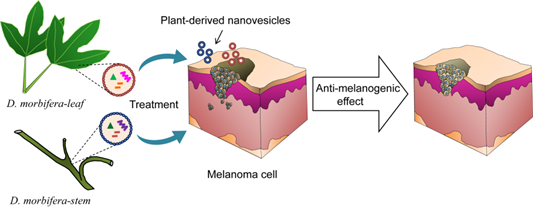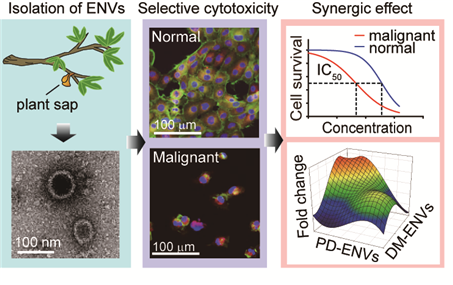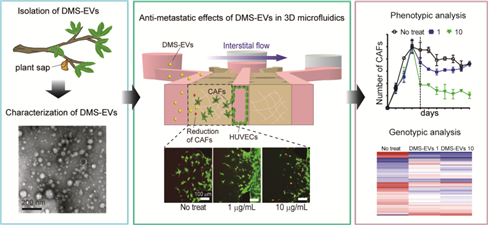
Yeon, Joo-heon, CEO of Well-Aging Exobio, received a degree from KAIST in △ Bioscience Department, Master of Science (2002.8-2004.8) △ KAIST in Bio and Brain Engineering, and a Ph.D. (2004.9-2010.2). △ Department of Mechanical and Aviation Engineering at Seoul National University (2011.6-2010.3) △ University of British Columbia (UBC), post-doctoral researcher (2014.8-2011.9) △ Korea Institute of Science and Technology (KIST) and post-doctoral researcher (2015.12-2014.12) before serving as a professor in January 2016. She started Well-Aging Exobio last January.
Cells are known to secrete Extracellular vesicles(EVs) wrapped in lipid double membranes of various sizes, and Extracellular vesicles(EVs) are classified by size as Micro vesicles(MVs), Apoptotic Body, Exosomes, etc. Among them, Exosome acts as a means of communication between cells, stimulating or inhibiting the metabolism of other cells. In addition, as it is drawing attention for early diagnosis of various diseases, it is very important to identify physiological phenomena, tissue constancy, and pathological phenomena, and research on secretion methods, transportation methods, and substances contained in Exosomes is actively conducted.
Exosomes contains proteins, fats, metabolites, mRNA and miRNA, binding proteins such as tubulin, actin, heat shock protein (Hsp70, Hsp90), trimeric G protein, and membrane proteins, CD9, CD63, CD81, and CD82 protein origin cells. Cells are known to secrete specific messages in the form of exosomes and are identified as belonging to specific cells by their surface markers or sizes. It also affects cells that are accommodated by mRNA, miRNA, and proteins in the Exosome. In this process, it plays an important role in intercellular communication and has higher bio-compatibility and in vivo stability than other existing types of particles.
Because exosomes are secreted in all cell types, they can reflect the state of cells and tissues secreted by each stage of development of metabolic diseases. Exosomes are found in blood, saliva, and urine, so if they are used, they can be diagnosed early on to diagnose diseases in cells, drawing attention as an innovative next-generation anti-cancer drug candidate. If exosomes are used, it is expected that early diagnosis of cell diseases such as diabetes, Parkinson's disease, and Alzheimer's will be possible in addition to chemotherapy. Exosomes are not secreted much in normal conditions, while exosomes increase secretion in abnormal conditions such as cancer, which can be a disease marker and is expected to lead to more effective new drug development by analyzing the role of exosomes in cancer. In particular, exosomes are expected to increase in the use of renewable medicines and functional cosmetics. Exosomes secreted from stem cells are in the spotlight for their functional cosmetics technology because they contain physiological active substances that are highly renewable.

Plant cell secretion exosome →
Separation from plant-derived extracts →
(1) Ingredients for cosmetics
(2) Food ingredients(Intestinal bristle absorption! Good for Immunity!)
(3) Ingredients for drugs
Until now, it has not been well known that plants as well as animals exosomes secrete exosomes. Recently, however, interest in plant exosomes has been increasing. Plant-derived exosomes are naturally secreted exosomes in plant leaves, stems, and roots. In addition to concentrating high concentrations of functional effective ingredients, naturally secreted exosomes can be actively absorbed by animal cells, and various functions and effects have been confirmed.
Patent applications using plant-derived exosomes began in 2011 under the leadership of the United States, and patent applications surged in mid-2015, with 10 to 40 applications taking place every year. In particular, Korea's share of applications by country is 48% of the total, with the largest portion of patents in the exosome related field, and the total number of applications has been on the rise since mid-2015. The U.S. is the only major applicant country that has been steadily applying since the beginning of the analysis until recently, while Japan and Europe have relatively small patent applications and patent applications.
In addition, considering the situation of the U.S., Japan, Europe, and Korea, Korean applicants seem to be more competitive than foreign applications, and Korean applicants have the largest number of patent applications not only in Korea, but also in the U.S., Japan, and Europe.
In the lab, among the various plants, I became interested in Korean dendropanax, which is a unique plant from the island's forest such as the southern coast of Korea and Jeju Island. This is because the leaves, stems, roots and sap of the Korean dendropanax have long been used as a folk remedy for various diseases.

The study recently revealed that exosomes extracted from the leaves and stems of the Korean dendropanax reduce melanin content and tyrosinase(TYR) activity in mouse melanoma(B16BL6) (Journal of extracellular vesicles 2020, 9:1703480). An electron microscope analysis confirmed that exosomes derived from Korean dendropanax leaves and exosomes derived from Korean dendropanax stems reduce the melanin content according to the concentration of exosomes in melanoma cells. It was also confirmed that Korean dendropanax leaves and stem exosomes had a higher whitening effect in melanoma melanin cells than in Albutin, a well-known whitening functional ingredient, and that especially leaf-derived exosomes had a higher whitening effect. Exosomes derived from the leaves and stems of the Korean dendropanax inhibited the expression of melanin-related genes and proteins, including MITF, TYR, TRP-1 and TRP-2, without causing cytotoxicity. Using human anthropomorphic parents model, exosomes derived from Korean dendropanax leaves showed a stronger inhibition of melanin production than albumin. This suggests that if the unique functionality of plant-derived exosomes is researched and developed, it has sufficient potential as a new functional cosmetics raw material.
Unlike active research on leaves, stems, and roots of natural plants, the effect on sap has not been widely studied, and it is often not known whether exosomes exist in the sap. It is also recognized that the physiological activity characteristics are unclear or that the efficacy ingredients are simple. Therefore, our laboratory expanded its study of the effects of plant leaves and stems to check the presence of exosomes in plant sap and to investigate the effects of various cancer cells by separating exosomes from Korean dendropanax known to have anticancer effects (Journal of Functional Biomedials 2020, 11:22).
It also isolated exosomes from four plants: Korean dendropanax, pine, and cypress, have been examined their effects on breast cancer, skin cancer and malignant melanoma. Comparing the influence of exosomes on normal cells, low metastatic cells, and malignant tumor cells, we found that cypress and cypress-derived exosomes did not significantly affect most cancer cells, but Korean dendropanax-derived exosomes selectively kill malignant tumor cells. In particular, it was confirmed that the effects of exosomes derived from Korean dendropanax on breast cancer cells and skin cancer cells and that the two exosomes were treated together had a synergistic effect. Through simulations, we checked the optimized concentration of exosomes on cancer cells, and found that they were consistent with the results of the actual experiment. Like this, plant-derived exosomes can be candidates for new anti-cancer substances as well as functional cosmetics ingredients.

In addition, we further investigated how the Korean dendropanax-derived exosomes based on a 3D microfluidic system closely mimicking the tumor environment in vivo, which has been developed in this laboratory so far, affect cancer transmission. In this laboratory, we found that the exosomes derived from the sap of the sulfide tree are an important member of the tumor micro-environment and have a concentration-dependent inhibitory effect on cancer-related fibroblasts CAFs, an important medium for cancer metastasis. In addition, it has been observed that the sulfide sap-derived exosomes alter the expression level of growth factors and extracellular substrate ECM-related genes, including intergrin and collagen. In other words, plant-derived exosomes can act as anti-CAF agents that reduce CAFs in tumor micro-environments.

By using plant-derived exosomes extraction technology differentiated from existing natural plant extracts, the company has retained several registered patents related to plant-derived exosomes, and its thesis on the efficacy of plant exosomes has been published in the Journal of Extracellular Vesicles (IF: 14.956). In addition, Korean dendropanax-derived Exosomes completed registration of cosmetics ingredients at home and abroad and were found to be ruthless in the first skin irritation test, and they released cosmetics containing them this year.
Plant-derived exosomes are new raw materials separated through new extraction methods, not by using natural plants, and are a key source technology in Korea that opened a new horizon for using plant-derived exosomes. These plant-derived exosomes can be highly functional cosmetics ingredients, and are expected to have a significant ripple effect, especially in informing that Korean native plants have great effects on skin health, disease prevention, and disease treatment.
In other words, exosomes, nanoparticles extracted and concentrated from Korea's unique natural plants, can be a next-generation technology that sends regenerative signals to cells to improve damaged skin and health, and they have high absorption rates as well as effective ingredients, which can be expected to emerge in small quantities.
Along with the Corona-19 crisis, the possibility of developing customized cosmetics, food, and pharmaceutical ingredients based on the various effects of Korean natural medicinal plants is endless, and natural plant-derived nano-particle materials are likely to grow as *K-materials in the future.
*Korea

